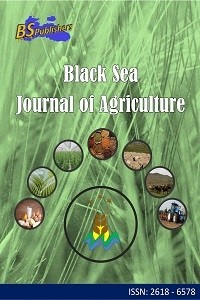
Black Sea Journal of Agriculture
Yazarlar: Cathy M. DWYER
Konular:Ziraat, Sütçülük ve Hayvan Bilimleri
Anahtar Kelimeler:Animal welfare,Sustainability,Productivity,Behaviour,Health
Özet: Globally we need to feed an increasingly urban and expanding population with a growing demand for meat, milk and eggs, against a background of reducing the carbon footprint of food production. Under these conditions is farm animal welfare a luxury that cannot be sustained? Animal welfare has been characterised in a number of different ways: to include aspects of the animal’s biological functioning, ability to live a natural life, and affective state. The oldest conception of animal welfare is the Five Freedoms, which has been adapted to the Five welfare Needs for a suitable environment, a suitable diet, to be able to exhibit normal behaviour patterns, to be with, or apart from, other animals and to be protected from pain, injury, suffering and disease. In lowly productive extensive livestock production systems, animals are often kept in conditions of variable nutrition, and experience high mortality and morbidity from preventable disease. For these systems animal welfare can be improved through actions which will simultaneously improve productivity (e.g. vaccination against disease, education in animal hygiene and management, and provision of improved nutrition, such as improved grassland management). Under these conditions animal welfare improvements are an integral part of improving production efficiency, and can benefit humans and animals simultaneously. Highly productive, intensive systems have increasing control of nutrition and health of the animals, and high productivity but reduce the space and opportunity for animals to express highly motivated behaviour (such as dust-bathing in chickens, or exploration in pigs). Under these conditions productivity gains have been achieved with animal welfare costs. However, these systems often have high inputs, require the use of antibiotics to sustain growth, and may have detrimental impacts on the immune function, fertility and longevity of animals within these systems. Paying attention to the needs of the animal can have both welfare and production efficiency benefits, and animal welfare should be seen as an integral component in improving sustainability of livestock production.